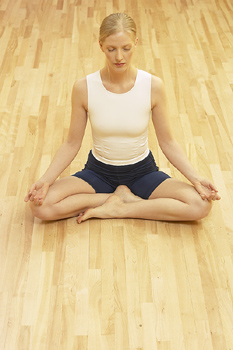How to Meditate
Learning how to meditate can be good for your mind, body, and spirit. Meditation relieves stress and generates a sense of inner peace. To experience the benefits of meditation, you need to consistently engage in a period of meditation each day. Just a daily fifteen minute meditation period can increase your level of concentration, generate an overall sense of calm, and help you maintain a positive attitude.
Meditation is easy. But most people go through each day with their mind and body in an overactive state, so it takes time to develop meditation techniques. It’s worth the commitment. Numerous books, CDs, and videos can introduce you to meditation.
- Commitment is an essential element in learning how to meditate. You should remain as committed and dedicated to your meditation time as you are to any other type of appointment.
- Comfort is another essential element in beginning a meditation practice. Wear comfortable clothes while meditating. It is not necessary that you meditate while sitting in the lotus position. Sitting in a chair with your back straight and your feet flat on the floor is perfectly fine.
- Location is important. Find a place where you will not be distracted. You need to meditate in a location where telephones, televisions, computers, voices, or any other variety of everyday noise will not disturb you. You may choose to meditate in a quiet area of your home or on your deck or patio. Meditating outdoors has the advantage of bringing you closer to nature and lessening the technological distractions that exist in most homes.
- Time is an important factor in learning how to meditate. You do not want to begin a period of meditation with a sense of urgency. Early morning is the optimum time for meditation for most people. When you first wake up, your mind is not filled with the day’s clutter. But select a time to meditate that fits into your schedule. You need to be able to maintain your commitment to yourself.
- Meditate for at least 15 minutes at a time. As you become more familiar with the art of meditation, increasing your time to thirty minutes will also increase the benefits you receive from meditation.

How to Meditate
- The method of meditation you engage in is a personal choice. You may want to alternate between different methods. If you are new to meditation, you may want to explore different methods to find the form of meditation that is best for you.
- Getting started is often the hardest part. Once you settle your body into a comfortable position, the next step is to quiet your mind. To clear your mind of miscellaneous thoughts may require some practice.
- Mantra meditation is a good way to stay focused on the meditative process. You simply concentrate and either mentally or audibly repeat a certain phrase. Mantra meditation makes your mind focus on that one word or phrase and keeps it from wandering toward busy thoughts.
- You might find it easier to meditate if you visually focus on a specific object. The flame of a candle could be your focal point. If you are meditating outdoors, you might want to focus on an object of nature such as a tree, a flower, or raindrops splashing on a leaf.
- Breath meditation is another form of meditation that you might want to try. Once you get into your chosen meditative position, relax your body and become consciously aware of your breathing. Simply sit and concentrate on each breath. Notice each time you inhale and each time you exhale. Think of nothing else during this time.
If you are just learning how to meditate, there are a few things you can do that might help you succeed in reaching your goal of being able to quiet your mind and relax your body. Lighting candles is a frequently used method of creating a relaxing atmosphere in the area you have designated for meditation. Playing music that is designed to help you achieve a meditative state is also helpful. The sound of moving water, either from an indoor fountain or in a natural setting, induces a state of relaxation.
Once you begin experiencing the mental clarity, inner peace, and physical relaxation that comes from regular meditation, you will protect the period of time you have set aside for meditation from disruption. The time you designate for meditation is a gift you give yourself and it is a gift that you will benefit from in all aspects of your daily life.
